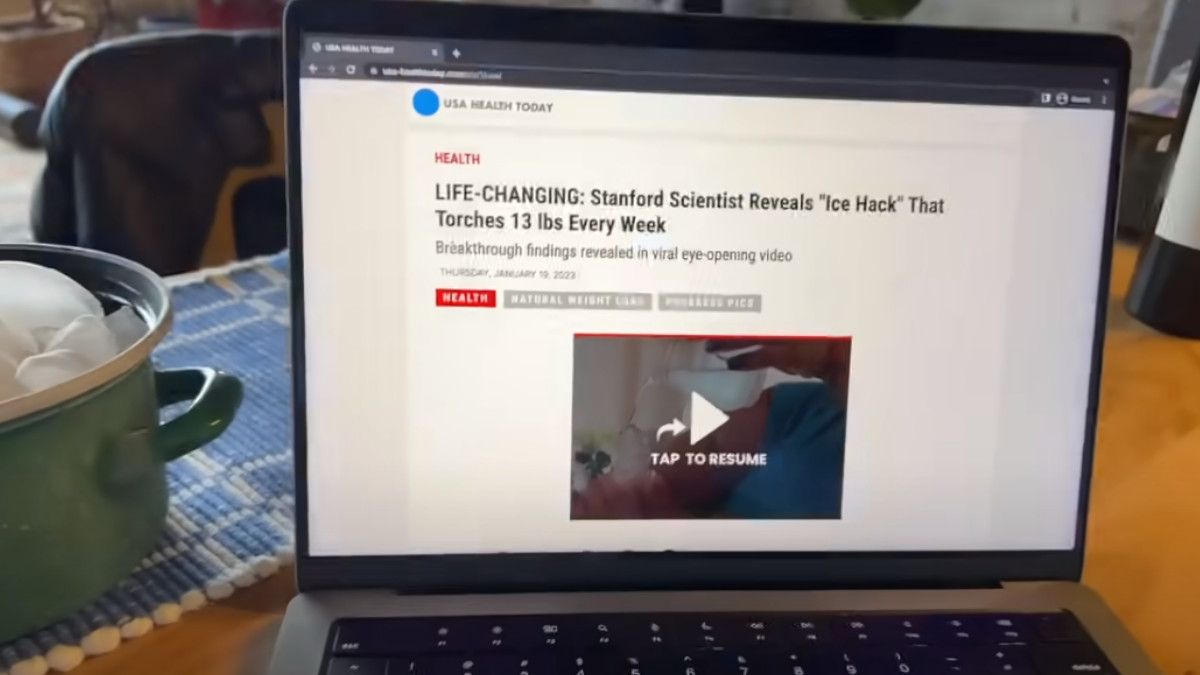Finding health advice online is challenging, as it is tricky to separate fact from fiction. Nowhere is this truer than with the alpine weight loss ice hack, a new trend that says it can help you quickly and easily lose weight.
But what is it, and is it dangerous?
What is the alpine weight loss ice hack?
This viral trend has been sparked by YouTube ads that purport to be someone talking about how this hack has helped other people, showing an article claiming that a woman lost 50 pounds in 27 days due to the hack. The video also says the narrator’s stepmother is losing 13 pounds per week due to the same hack.
However, this isn’t all that it seems, as the videos are actually an ad for a dietary supplement called Alpilean. This supplement says it can help those who take it quickly lose weight. It should be noted that Alpilean nor this “hack” are new. In fact, earlier this year, Snopes reported that YouTube has previously taken down videos promoting the product, citing its “spam, deceptive practices, and scams” policy.
Several people contacted Snopes and explained what happens if you follow the links in the ad. This proves that the promised “hack” doesn’t exist and merely exists to get you to buy Alpilean.
One person explained:
“Is the Alpilean advertisement through Facebook real? It takes you to a website that has you watch about an hour-long video to learn about a miracle weight loss ice hack. It’s actually just a ploy to sell supplements containing Himalayan herbs with tons of “doctor” claims and studies. There is not a single negative claim on the first few pages on Google, and the YouTube videos are all very new videos (around five days old) all praising their claims. It is advertised as a quick 17-second habit to reduce weight loss.”
Another reader backs this account up. They describe their experience by saying:
“Saw this “weight loss miracle story” on Facebook called the “Alpine Hack” and features several times a glass of ice cubes. But of course, you have to listen to a 20 min (or so) video explaining where the ingredients come from that are in the capsules you take. Apparently from the Himalayas, 215,000+ people are claimed to have tried it and lost weight by “resetting the inner body temperature” to burn calories efficiently.”
It should be noted that if you search for Alpilean online, you’ll find many sketchy articles promoting the product. Interestingly, many of these articles use the same or suspiciously similar text, making it clear they all originate from the company behind Alpilean. While some of these articles, like the one on SFGate, are marked as “paid advertising,” many are not.
Many sites promoting the product are designed to look like more famous publications. One such publication is featured in the currently running video ad, which directs people to an article on USA Health Today, a site designed to look like the USA Today website, despite not being linked to that publication.
This fakery continues as the images the advert uses, claiming to show a person’s transformation using the “hack” comes from a Facebook post made by CodeRedLifestyle, another dieting program. This post was posted in 2016, long before the first mention of Alpilean or its hack.
Is the alpine weight loss ice hack dangerous?
It is unknown if Alpilean is dangerous or not. However, their deceptive marketing tactics make it likely that the supplement will not have the effects the adverts promise.
The National Institutes Of Health’s page on weight loss supplements contains a fantastic table that lists commonly used ingredients in weight loss supplements and points out if they have any evidence of efficiency. When you cross-reference the ingredients Alpilean promotes with this table, you find that most have little to no scientific backing.
This includes:
- Fucoxanthin Extract – Has been “studied only in combination with pomegranate-seed oil in one trial in humans” but has “insufficient research to draw firm conclusions.”
- African Mango Seed – “Few clinical trials, all with small sample sizes” led to “possible modest reduction in body weight and waist circumference.”
- Citrus Aurantium Fruit– Has been in “small clinical trials of poor methodological quality,” which said it has “inconclusive effects on weight loss.”
You should always consult with your doctor before buying or consuming dietary supplements. The National Institute Of Health cites a report by the U.S. Government Accountability Office which notes that:
In summary, little is known about whether weight loss supplements are effective, but some supplements have been associated with the potential for physical harm. Health consequences, which can be serious, may result from the use of the supplement itself or from the interaction of the supplement with medications or foods. People with certain underlying health conditions, such as heart disease, high blood pressure, and diabetes, may be particularly at risk. In addition, supplements may be contaminated with harmful ingredients or may not contain the amount of an active ingredient that is stated on the label.
